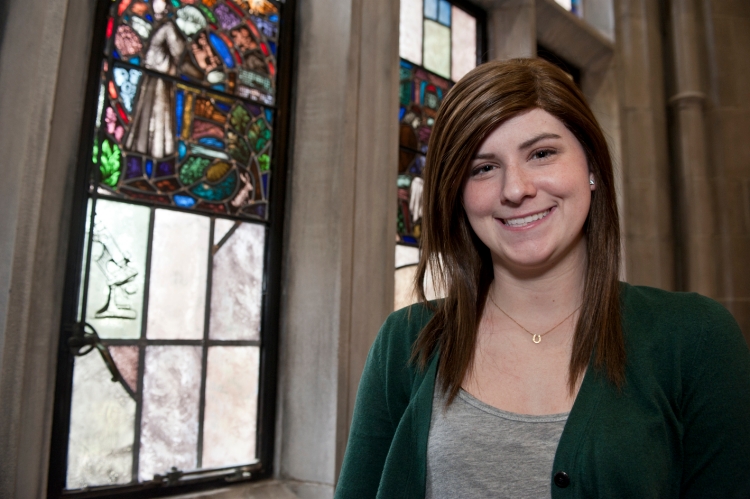
By
No buffets or salad bars. No using communal bathrooms. No on-campus housing. No more than one roommate.
This is what being a Boston College student again entails for Meghan Woody ’14, who brings along a surgical mask to wear, plus about a dozen bottles of hand sanitizers, for a typical day of classes. That’s how it is when your body’s immune system is practically non-existent, leaving you vulnerable to the simplest infection.
“I have to be particularly careful this time of year, what with colds and flu going around,” says Woody, an Overland Park, Kan., native. “Even if it’s someone just with sniffles, I have to stay away, or I’m asking for trouble.”
Woody isn’t looking for pity — just a life that’s something close to normal. The word “normal,” however, became a relative term the summer following her freshman year, when she was diagnosed with acute myeloid leukemia. She missed the fall 2010 semester while recovering from chemotherapy, then returned to campus the following semester.
But last June, Woody found out the cancer had returned (“Meghan, we have a problem,” Woody recalls her doctor telling her. “You might want to call your mother.”), and underwent a bone marrow transplant two days before she turned 21. Once again, Woody was forced to put her college plans to the side as she waited to see if the treatment worked — a 50-50 proposition. When the signs looked encouraging, she began making arrangements to resume her studies, and last month returned to BC.
“During preparations for the transplant, I asked the medical staff, ‘How good would I have to do to come back to BC next semester?’” says Woody. “They said it probably wouldn’t happen until the fall of 2012. But I kept saying, ‘Look, I need to go back to school.’ Finally, my doctor said it was OK, and if he says it’s OK, I knew it was.”
As a cancer survivor, Woody will be recognized at the Feb. 24 Relay for Life event, and earlier that day will see another, even more appropriate honor: a bone marrow registration drive organized by several of her friends. The drive — which is not officially part of Relay for Life — will take place at the Flynn Recreation Complex from 3-6 p.m.; there will be additional opportunities to sign up for the bone marrow registry during Relay for Life.
It would be no surprise if Woody might be feeling a touch of déjà vu: Wasn’t it exactly a year ago she was preparing to take part in Relay for Life, rejoicing at the resumption of her BC studies? This time around, Woody seems perhaps more guarded in her optimism, even as she remains determined to pursue her degree.
“It’s been tough,” she acknowledges, “what with the restrictions because my immune system is weak” — a temporary result of the bone marrow transplant — “and that I get winded pretty easily. After spending your days not being able to do much more than watch TV, it’s a huge transition to go back into a society that idealizes good health and ‘normal’ life.”
But make no mistake, Woody is glad to be back at BC and among her friends again. She expresses gratitude toward those in the BC community who have given their support, like former College of Arts and Sciences Honors Program Director Mark O’Connor and Academic Advising Center Associate Director Elizabeth Chadwick, who helped her tackle the red tape stemming from her two missed semesters.
Like many cancer survivors, Woody grapples with a fundamental question: Does this disease define who I am? Certainly cancer forced her to confront critical issues and examine her innermost beliefs and fears — sometimes via the blog she created after her diagnosis — with an intensity she never imagined. She also realizes that the first impression people may have of her is of “that girl who’s had cancer.”
“Most of my friends know me well enough to have a fuller picture of me, as I am,” Woody says. At the same time, she adds, “it’s not necessarily a terrible thing to be known as ‘the girl who’s had cancer,’ because it could be far worse — like being known as ‘the girl who died from cancer.’”
Putting cancer in the past tense is not a given, Woody notes. At this point, she says, any complications ensuing from the bone marrow transplant are likely to be quality-of-life issues, rather than a matter of survival. But there is still a 25 percent she could relapse — and if that happens, she says, “there’s often not much they can do.” She sees a doctor at Beth Israel Hospital every couple of weeks, to have her progress monitored.
It is possible sometimes, Woody says, for her to actually forget about cancer. Not completely, though: “There’ll be something on TV that mentions cancer. Or I’ll see a bruise on my foot and wonder if it’s a sign that something’s wrong.” When she goes to see her doctor, she says, “I pack a bag.”
If Woody can divide her life into “before cancer” and “since cancer” periods, there is one thing that straddles them both: her career goal.
“I wanted to be a doctor well before I got sick,” says Woody, who served an internship at a hospital last year. “Having cancer has only strengthened my desire, because of the perspective I’ve gained. Now, I have to become a doctor.”



